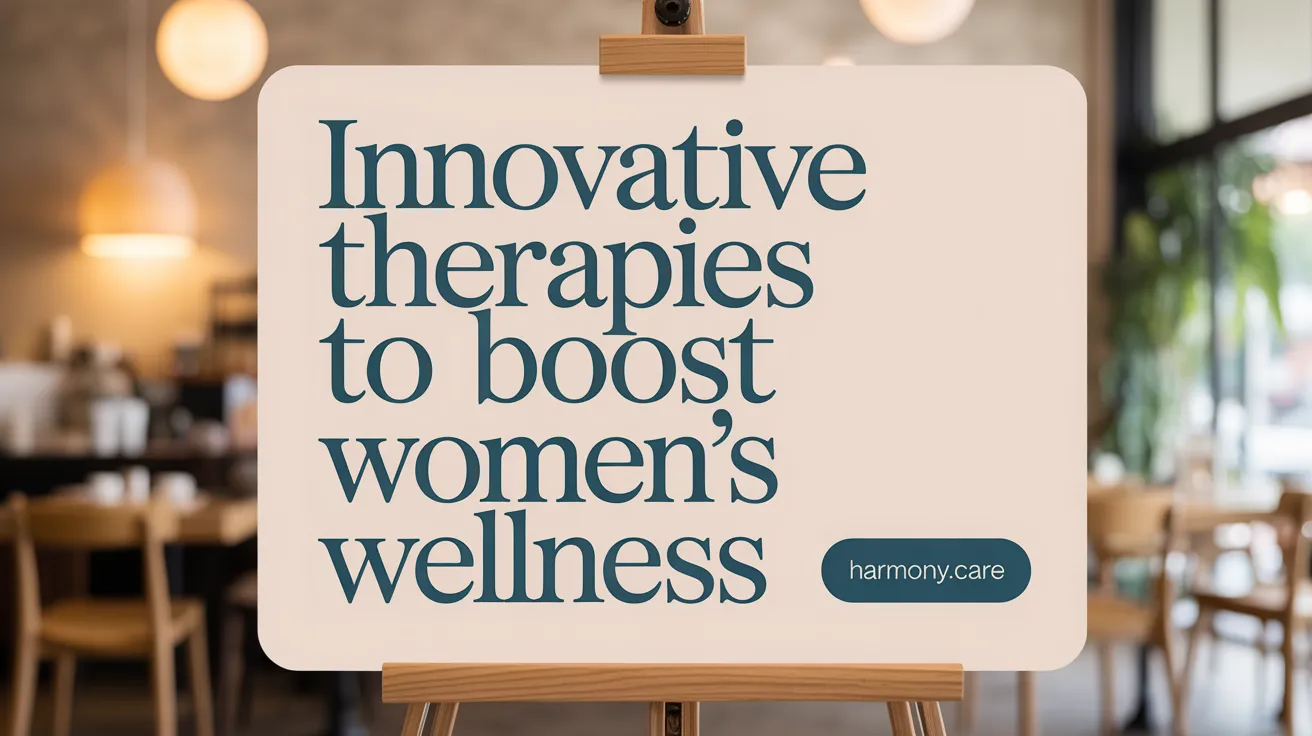Embracing Holistic Wellness for Women’s Lifelong Vitality
Embracing Holistic Wellness for Women’s Lifelong Vitality
Holistic health for women centers on caring for the whole person—mind, body, and spirit—recognizing that true wellness arises from balance across these interconnected aspects. This approach goes beyond treating symptoms, aiming to identify and address the root causes of health challenges through personalized care.
Whole-person care involves integrating physical health with emotional well-being, nutrition, lifestyle, and environmental factors. Practices such as mindfulness, nutrition optimization, targeted supplements, and movement tailored to individual needs form the foundation of this comprehensive care.
The long-term benefits of embracing integrative women’s health are profound. Women experience improved hormonal balance, enhanced mental clarity, reduced chronic disease risk, and greater vitality. By prioritizing prevention, personalized therapies, and sustainable lifestyle changes, holistic wellness supports women’s health through all stages of life, empowering them to thrive with resilience and purpose.
Foundations of Holistic Women's Health Across Life Stages

How do nutrition and physical activity support women's health during adolescence and adulthood?
Nutrition plays a crucial role in supporting women's health from adolescence through adulthood. A balanced diet rich in fruits, vegetables, whole grains, lean proteins, and essential vitamins such as iron, calcium, and folic acid provides the foundation for hormonal balance, physical development, and energy levels. During adolescence, these nutrients support skin health and growth, while in adulthood they sustain bone strength and reproductive health.
Physical activity complements nutrition by enhancing cardiovascular health, strength, and flexibility. Engaging in regular cardiovascular exercise benefits, strength training, and activities promoting flexibility supports women's vitality and long-term well-being, helping to maintain healthy weight and reduce risks of chronic diseases.
What emotional well-being practices benefit women at each stage of life?
Emotional health is integral to holistic wellness. Practices such as mindfulness, journaling, yoga, and meditation are valuable across all life stages. These activities help reduce stress, foster resilience, and promote mental clarity.
During teenage years, mindfulness and journaling support emotional development and coping skills. In adulthood, including motherhood and beyond, these practices assist with managing stress and balancing hormonal changes. Additionally, mental health support and counseling play an important role in addressing challenges such as anxiety and depression, which are prevalent among women.
Why are regular screenings and preventive care essential?
Preventive care with regular screenings, such as gynecological exams, blood pressure monitoring, and cancer screenings, is vital for early detection of potential health issues. Screening for conditions like HPV, STDs, breast and cervical cancers, and metabolic health ensures timely interventions that can improve outcomes.
Personalized healthcare based on age and risk factors, offered through comprehensive well-woman visits, empowers women to take charge of their health. Immunizations, including HPV and flu vaccines, further support long-term wellness.
How is postpartum recovery and menopausal management approached holistically?
Postpartum recovery emphasizes gentle exercise, adequate sleep, emotional support, and social connection to promote physical and mental well-being. A focus on nutrition rich in folate, iron, omega-3 fatty acids, and calcium aids recovery and supports breastfeeding (Postpartum recovery tips and gentle exercise, Sleep and emotional support postpartum).
Menopausal management incorporates lifestyle modifications such as diets rich in phytoestrogens, weight-bearing exercises for bone and heart health, and stress reduction techniques like acupuncture and mindfulness. Bioidentical hormone therapy and herbal supplements may also be considered under personalized care plans.
Together, these holistic strategies create a comprehensive foundation for women's health, emphasizing prevention, balance, and individualized care at every life stage.
Functional and Naturopathic Medicine: Root Cause and Personalized Care

What is the functional medicine framework for women's health?
Functional medicine is a personalized, science-based approach that seeks to identify and address the root causes of health concerns by examining the intricate connections among genetics, environment, lifestyle, and physiology. In women's health, it looks beyond symptom management to optimize hormonal balance, reproductive function, and overall vitality. This method offers detailed assessments including advanced lab testing and considers mental, emotional, and physical health holistically. Treatment plans evolve based on thorough evaluations with a focus on empowering women to regain long-term wellness. For more information, see Functional medicine framework, Functional Medicine Approach to Women's Health, and Functional medicine personalized programs.
What are naturopathic principles and natural therapies?
Naturopathic principles and natural therapies prioritize the body’s innate healing capabilities by using natural, gentle therapies. It emphasizes treating the whole person—addressing physical, emotional, and lifestyle factors rather than just symptoms. Common naturopathic principles include minimizing harm, supporting natural healing, preventive care, education, and treating root causes. Therapies often encompass clinical nutrition, herbal medicine, lifestyle counseling, acupuncture, homeopathy, and targeted supplementation tailored for women's unique health needs across life stages. For detailed insights, see Naturopathy for women, Naturopathic women's health, and Naturopathic approaches to women's health.
How do comprehensive lab testing and personalized treatment support women's health?
Both functional and naturopathic approaches utilize comprehensive lab testing to gain insight into hormone levels, thyroid function, adrenals, nutrient status, inflammation, and gut health. These tests help craft highly personalized treatment plans targeting specific imbalances such as PCOS, menopause symptoms, or thyroid disorders. Detailed lab analyses enable practitioners to customize natural therapies, hormone support, dietary changes, and lifestyle strategies to optimize health outcomes. Learn more about this process at Functional Medicine Approach to Women's Health, Personalized Functional Medicine Care, and Women's Health Services – Integrative Care.
How are lifestyle modifications and supplements integrated into care?
Lifestyle plays a central role in these holistic approaches—encouraging nutrient-dense diets rich in fruits, vegetables, and phytonutrients, regular movement including strength and flexibility exercises, and stress management techniques such as mindfulness, yoga, and journaling. Supplements like adaptogens (ashwagandha, maca), targeted vitamins (D, magnesium), and botanical remedies complement natural hormone regulation and symptom relief. Sleep hygiene, environmental toxin reduction, and emotional well-being practices are also integral to restoring balance and supporting sustainable health for women throughout all life stages. Explore these topics further at Holistic health and wellness for women, Holistic approaches to women's health and wellness, and Holistic Approach to Women's Health.
The Role of Mind-Body Practices and Stress Management in Hormonal Balance

How Does Chronic Stress Affect Hormonal and Immune Systems?
Chronic stress disrupts the delicate balance of hormones, leading to imbalances that can affect reproductive health, mood, and overall well-being. Elevated stress hormones like cortisol interfere with estrogen and progesterone production, weaken immune function, and increase inflammation, which can exacerbate conditions such as PMS, PCOS, and menopausal symptoms. For more on hormonal balance disruption and immune health, see Holistic Women's Health approaches and Holistic approach to women's health.
What Are the Benefits of Mindfulness, Yoga, Meditation, and Journaling?
Mind-body practices like mindfulness, yoga, and meditation cultivate emotional awareness and physiological relaxation. These techniques lower cortisol levels, promote better sleep, and enhance resilience to stress. Journaling supports emotional clarity and helps women process feelings, reducing anxiety and improving mood regulation during hormonal fluctuations. Learn about these mindfulness techniques and emotional well-being practices and Holistic women's health.
Which Stress Reduction Techniques Promote Emotional Resiliency?
Techniques that combine breathwork, gentle movement, mindfulness, and cognitive reflection empower women to manage stress effectively. Meditation practices enhance focus and calm, yoga improves physical and mental flexibility, while gratitude and mindful journaling foster positive emotional states. Regular incorporation of these approaches helps rebuild emotional resilience against hormonal stressors. Find detailed information on stress reduction and holistic emotional support and Holistic approaches to women's health and wellness.
How Is Mental and Emotional Health Supported Holistically?
Holistic care addresses mental wellness alongside physical health by integrating therapeutic counseling, mind-body therapies, and supportive community resources. This comprehensive support mitigates anxiety, depression, and mood swings that often accompany hormonal transitions, emphasizing personalized strategies that nurture both mind and body for long-term balance and vitality. Explore holistic mental health support at Women's Wellness Atlanta and Holistic women's wellness.
Innovative Holistic Therapies and Integrative Treatments Enhancing Women's Wellness

What is Bioidentical Hormone Replacement Therapy (BHRT)?
Bioidentical Hormone Replacement Therapy uses plant-derived hormones that are chemically identical to those the body produces. BHRT offers personalized treatment plans to manage menopausal symptoms such as hot flashes, mood swings, and hormonal imbalances with a natural approach. Unlike conventional hormone treatments, BHRT focuses on restoring hormonal balance gently and safely, often improving energy levels, mood, and quality of life.
How Do Pelvic Physical Therapy and Regenerative Medicine Support Women's Health?
Pelvic physical therapy addresses pelvic floor dysfunction, incontinence, and discomfort by strengthening muscles and improving bodily awareness. Holistic approaches incorporate mindful movement and breathwork, fostering resilience and confidence. Regenerative medicine therapies, including innovative treatments like REGENmax, use shock-wave therapy and laser techniques to promote tissue healing and sexual wellness, enhancing vitality and physical function.
What Role Do Herbal Medicine, Acupuncture, and Complementary Therapies Play?
Herbal medicine and acupuncture are central to holistic women's care, offering natural methods to ease menstrual irregularities, menopausal symptoms, and stress. Adaptogenic herbs such as ashwagandha and chaste tree help balance hormones, while acupuncture supports emotional well-being and alleviates pain. Complementary therapies like massage, mindfulness, yoga, and meditation contribute to stress reduction and promote mind-body harmony essential for overall wellness.
How Are Technology and Advanced Diagnostics Integrated into Holistic Care?
Advanced diagnostics, including comprehensive hormone panels and functional labs, enable personalized assessments to identify root causes of health concerns. Tools like thermography augment traditional screenings, offering non-invasive insights into breast and thyroid health. Emerging technologies combined with functional medicine principles facilitate tailored treatment adjustments, empowering women to track symptoms and optimize long-term health naturally.
These integrative therapies emphasize personalized, natural, and evidence-based approaches, forming a comprehensive model based on Naturopathic principles and natural therapies that supports women’s physical, emotional, and spiritual well-being throughout their lives.
Empowering Women Through Education, Preventive Care, and Personalized Wellness Planning

Patient-Centered Care and Shared Decision-Making
Empowering women in healthcare begins with a patient-centered approach that values open communication, active listening, and shared decision-making. When women are fully informed and involved in choices about their health, they gain confidence to advocate for themselves. This collaborative care model supports individualized treatment plans that respect each woman's unique needs, preferences, and life circumstances.
Nutrition, Exercise, and Lifestyle Education
Educating women on balanced nutrition, regular physical activity, and healthy lifestyle habits is essential for long-term wellness. Emphasizing a diet rich in fruits, vegetables, whole grains, lean proteins, and key nutrients like iron, calcium, and folic acid benefits supports hormonal balance and vitality at any age. Encouraging daily movement—including cardiovascular exercise benefits, strength training for women, and flexibility exercises—improves physical health and emotional well-being.
Preventive Screenings and Vaccination Importance
Regular preventive screenings such as gynecological exams, cancer screenings, blood pressure checks, and diagnostic testing enable early detection and intervention, minimizing risks to reproductive and overall health. Vaccinations—including HPV vaccination in women, influenza, and hepatitis—play a vital role in disease prevention throughout all stages of a woman's life. Access to routine screening is a cornerstone of holistic, proactive care.
Community Support and Healthcare Navigation
Connecting women to community resources and supportive networks enhances their capacity to manage health effectively. Guidance in navigating healthcare systems and insurance helps overcome barriers to care, ensuring access to personalized and comprehensive services. Empowerment through education, social support, and healthcare coordination fosters resilience and lasting wellness (Holistic approach to women's health).
By integrating education, prevention, and personalized care within a compassionate framework, women are equipped to achieve sustained health and vitality throughout their life journey.
Towards Sustainable Vitality: The Future of Holistic Women’s Health
Long-Term Health Benefits of Holistic Approaches
Holistic care fosters sustainable vitality by addressing the root causes of health issues, promoting balanced nutrition, stress management, and lifestyle adjustments tailored to each woman’s unique needs. This comprehensive approach supports hormonal balance, immune function, and emotional well-being across all life stages.
The Importance of Continued Integrative Care
Ongoing integrative care combines conventional medicine with natural therapies and functional assessments to monitor health changes and optimize treatments. Personalized plans evolve with a woman’s life transitions, ensuring preventive measures and symptom management aimed at longevity and quality of life.
Empowerment Through Knowledge and Personalized Support
Educating women about their health empowers informed decision-making and encourages active participation in care. Access to personalized support, including counseling and holistic resources, helps women navigate health challenges confidently, fostering resilience and self-advocacy for long-term wellness.
